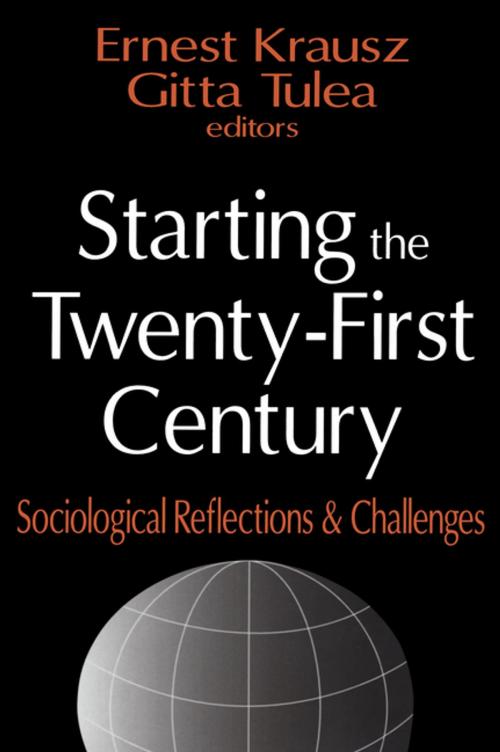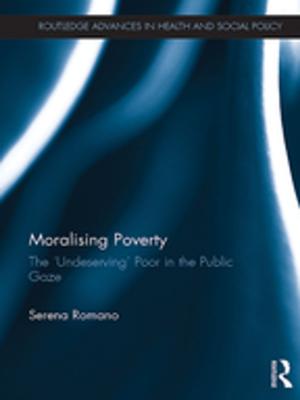Starting the Twenty-first Century
Sociological Reflections and Challenges
Nonfiction, Social & Cultural Studies, Social Science, Sociology, History| Author: | ISBN: | 9781351325189 | |
| Publisher: | Taylor and Francis | Publication: | April 17, 2018 |
| Imprint: | Routledge | Language: | English |
| Author: | |
| ISBN: | 9781351325189 |
| Publisher: | Taylor and Francis |
| Publication: | April 17, 2018 |
| Imprint: | Routledge |
| Language: | English |
Jrgen Habermas, speaking of postmodern society, remarked that extension of the means of communication not only allows a wide range of information, but it also encourages permanent connections between different peoples, cultures, and social discourses. It thus facilitates better general understanding, a clarifying of real or apparent contradictions. But this process becomes truly positive only when it is performed between equal members. Globalization of information does not minimize the possibility of conflict or terrorism, if fundamental social problems are not resolved or at least approached in an active way.
This volume examines the major upheavals of the twentieth century and views within the framework of these events and challenges implications for the future. "Values and Cultural Changes in the Postmodern World," by Zygmunt Bauman explores the changing meaning of space in the globalizing environment; S.N. Eisenstadt analyzes the destructive components of modernity; and Irving Louis Horowitz draws attention to the classical values of the common universal culture. "Social Development and Policies in Contemporary Society," by Michael M. Cernea, examines the importance of the applied and policy-orientated research, especially in the developing countries, and David Marsland stresses the positive role of sociology in pointing to the possibilities of improving healthcare in modern society. "Societies in Transition-Eastern Europe," emphasizes transitions that have occurred in Eastern Europe. Rozalina Rjyvkina and Leonid Kosals provide an incisive study of the situation in Russia, while Jerzy J. Wiatr presents a comparative analysis of postcommunist societies, with special reference to Poland. "The Jewish World: Pre- and Post-Holocaust," by Regina Azria, discusses the identity problems in the Diaspora confronting modernity; Eva Etzioni-Halevi considers the newly developed Israeli society from the point of view of the exercise and distribution of power; and a most interesting contribution by Annette Wieviorka concerns the material and spiritual effects of the Holocaust on the Jews of France.
Social historians and students of Judaica, as well as a general public interested in cultural pluralism will find this well-developed volume essential reading.
Jrgen Habermas, speaking of postmodern society, remarked that extension of the means of communication not only allows a wide range of information, but it also encourages permanent connections between different peoples, cultures, and social discourses. It thus facilitates better general understanding, a clarifying of real or apparent contradictions. But this process becomes truly positive only when it is performed between equal members. Globalization of information does not minimize the possibility of conflict or terrorism, if fundamental social problems are not resolved or at least approached in an active way.
This volume examines the major upheavals of the twentieth century and views within the framework of these events and challenges implications for the future. "Values and Cultural Changes in the Postmodern World," by Zygmunt Bauman explores the changing meaning of space in the globalizing environment; S.N. Eisenstadt analyzes the destructive components of modernity; and Irving Louis Horowitz draws attention to the classical values of the common universal culture. "Social Development and Policies in Contemporary Society," by Michael M. Cernea, examines the importance of the applied and policy-orientated research, especially in the developing countries, and David Marsland stresses the positive role of sociology in pointing to the possibilities of improving healthcare in modern society. "Societies in Transition-Eastern Europe," emphasizes transitions that have occurred in Eastern Europe. Rozalina Rjyvkina and Leonid Kosals provide an incisive study of the situation in Russia, while Jerzy J. Wiatr presents a comparative analysis of postcommunist societies, with special reference to Poland. "The Jewish World: Pre- and Post-Holocaust," by Regina Azria, discusses the identity problems in the Diaspora confronting modernity; Eva Etzioni-Halevi considers the newly developed Israeli society from the point of view of the exercise and distribution of power; and a most interesting contribution by Annette Wieviorka concerns the material and spiritual effects of the Holocaust on the Jews of France.
Social historians and students of Judaica, as well as a general public interested in cultural pluralism will find this well-developed volume essential reading.















